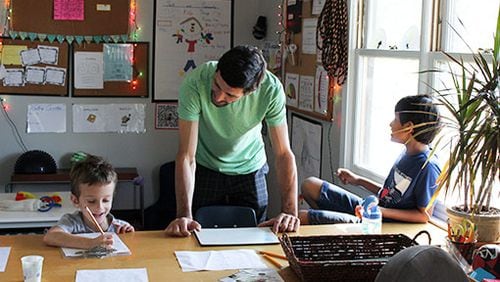The Cloverleaf School, founded for students with “neurological processing differences,” abruptly announced it was closing March 30, disappointing many parents who felt they found a space where their child could flourish.
“I’ve seen so much progress,” Cloverleaf parent Kimberly Wallace-Sanders said about her son, Joshua. “I couldn’t believe it. This is such a devastating thing.”
According to a letter from Cloverleaf’s board of directors, the decision was made due to the Decatur school’s financial challenges, saying cash-flow issues would make keeping the school open through the end of the school year impossible. The school’s 20 or so students have been accepted at The Cumberland Academy in Sandy Springs, and will remain with their same teachers through the end of the school year.
“We spent a lot of time analyzing the financial health of the organization, trying to sustain the model Cloverleaf had,” said Shari Bayer, who joined the school’s board of directors last year. “We were handed an untenable situation. It’s heartbreaking to be in this position right now.”
According to the school’s website, it was founded in January 2012 by four parents who bonded over the shared experience of raising children with processing deficiencies and wanted to create a space for their children and others who needed an environment that wasn’t being offered. Most students there have been diagnosed with Attention Deficit Hyperactivity Disorder, autism, Aspberger Syndrome, and anxiety. Jen Owen, one of those founders who took a prominent role in shaping the school’s vision and programming, departed last March. It opened the floodgates as other personnel followed.
The principal and executive director departed just before Christmas. A middle-school teacher left a few weeks ago.
At the school, Bayer said classrooms typically held about four children, and a teacher would have another teacher there for individual student support. The one-on-one interaction was what attracted her to the school for her own child, who attended two years until leaving last summer.
“No other private school does that,” she said.
John Foreman said he was concerned that the school’s abrupt closure hurt students because many alternative schools have application processes that already have ended for the year.
“It’s like you enter into a dead sprint in a race that’s already finished, which is really … hard,” said Foreman, whose son, St. John, started at the Cloverleaf school midway through the last school year.
Foreman said he is sad to see the school close. St. John was showing significant progress in his first full year at the school. A student who was not a fan of writing, St. John is now writing and illustrating his own comic books.
“You just get a sense that the model of having more personal attention for these kids really works well,” he said.
Wallace-Sanders said the school gave her 10-year-old the chance at a normal life. Joshua is on the autism spectrum and was also diagnosed with ADHD. In his last school, he would be excluded from party invite lists and often dealt more with aides than other students.
“Children liked him, but he’s more work,” she said.
It was different at Cloverleaf. Wallace-Sanders said the school has a sensory room where children can work off excess energy, of which Joshua has plenty. The room helps to keep him focused.
And when he arrived at the beginning of this school year, one of the students invited him to a back-to-school party.
“Everything they put in place, Joshua responded to well,” she said. “And … he was hugging. He’d hug all the teachers. I’ve never seen Joshua do that before.”
About the Author







